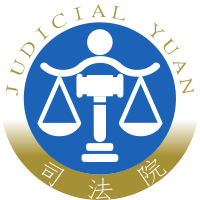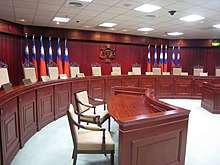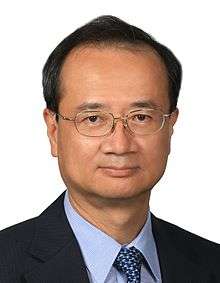Judicial Yuan
The Judicial Yuan (Chinese: 司法院; pinyin: Sīfǎ Yuàn; Wade–Giles: Szu1-fa3 Yüan4; Pe̍h-ōe-jī: Su-hoat Īⁿ) is the judicial branch of the government of the Republic of China on Taiwan.[1]
| Judicial Yuan (Constitutional Court) | |
|---|---|
| 司法院 Sīfǎ Yuàn (Mandarin) Sṳ̂-fap Yen (Hakka) | |
 | |
| Established | 1937 |
| Location | Zhongzheng, Taipei, Taiwan |
| Coordinates | 25.0379°N 121.5121°E |
| Composition method | Presidential nomination with Legislative Yuan consent |
| Authorized by | Constitution of the Republic of China |
| Judge term length | 8 years |
| Number of positions | 15 |
| Website | www.judicial.gov.tw |
| President and Chief Justice | |
| Currently | Hsu Tzong-li |
| Since | 1 November 2016 |
| Vice President and Justice | |
| Currently | Tsai Jeong-duen |
| Since | 1 November 2016 |
| Judicial Yuan | |||||||||||||||||||||||||||
|---|---|---|---|---|---|---|---|---|---|---|---|---|---|---|---|---|---|---|---|---|---|---|---|---|---|---|---|
| Chinese | 司法院 | ||||||||||||||||||||||||||
| |||||||||||||||||||||||||||
 |
|---|
| This article is part of a series on the politics and government of the Republic of China |
|
|
|
|
|
|
|
Related topics |
|
|
Its Justices of the Constitutional Court (大法官會議, literally ‘Council of Grand Justices’), with 15 members,[2] is charged with interpreting the Constitution.[1] The President and Vice President of the Judicial Yuan are chosen from among the Justices by the President. Eight of the grand justices, including the president and vice president of the Judicial Yuan, serve four-year terms, and the remaining justices serve eight-year terms.[2]
The Judicial Yuan also supervises the Supreme Court, the high courts, the district courts, the Administrative Court, and the Commission on the Disciplinary Sanctions of Public Functionaries.[1]
According to Articles 77 and 78 of the Constitution of the Republic of China,[1] Article 5 of the Additional Articles of the Constitution,[2] Articles 30, 43, and 75 of the Local Government Systems Act, the major functions of the Judicial Yuan are as follows:[3]
- To interpret the Constitution and to unify the interpretation of laws and orders;[3]
- To impeach the President and the Vice President of the Republic and to adjudicate cases concerning the dissolution of political parties that violate the Constitution;[3]
- To adjudicate civil and criminal cases;[3]
- To adjudicate administrative cases;[3]
- To adjudicate cases concerning disciplinary measures with respect to public functionaries;[3] and
- To interpret whether local self-government ordinances and matters conflict with national laws or the Constitution.[3]
- Judicial Administrative Power of the Constitutional Court.[3]
Justices of the Constitutional Court


The Justices of the Constitutional Court (also known as the Council of Grand Justices) provides rulings on the following four categories of cases:
- Interpretation of the Constitution;
- Uniform Interpretation of Statutes and Regulations;
- Impeachment of President and Vice President of the Republic of China; and
- Declaring the dissolution of political parties in violation of the Constitution.[1][2]
A petition for an interpretation of the Constitution shall be filed in the following circumstances:[3]
- Where a central or local government agency is uncertain regarding the application of the Constitution while exercising its powers, or, if the agency, while exercising its powers, has disputes with another agency regarding the application of the Constitution, or if the agency is uncertain of the constitutionality of a particular law or order when applying the same;[3]
- Where an individual, a juristic person, or a political party, alleges that his or its constitutional right has been infringed and who has exhausted all judicial remedies provided by law, questions the constitutionality of the law or order applied by the court of last resort in its final decision;[3]
- Where the Members of the Legislative Yuan, in exercising their powers, are uncertain regarding the application of the Constitution or with regard to the constitutionality of a particular law when applying the same, and at least one-third of the total number of the Members of the Legislative Yuan have filed a petition;[3] or
- Where any court believes that a particular law, which it is applying to a case pending with it, is in conflict with the Constitution.[3]
List of Justices of the Constitutional Court
The Justices are:[4]
- The Honorable Chief Justice and President of the Judicial Yuan Hsu Tzong-li
- The Honorable Justice and Vice President of the Judicial Yuan Su Yeong-chin
- The Honorable Justice Lin Sea-yau
- The Honorable Justice Chih Chi-ming
- The Honorable Justice Li Chen-shan
- The Honorable Justice Tsay Ching-you
- The Honorable Justice Huang Mao-zong
- The Honorable Justice Chen Ming
- The Honorable Justice Yeh Pai-hsiu
- The Honorable Justice Chen Chun-sheng
- The Honorable Justice Chen Shin-min
- The Honorable Justice Chen Be-yue
- The Honorable Justice Huang Hsi-chun
- The Honorable Justice Lo Chang-fa
- The Honorable Justice Tang Te-chung
Ordinary courts
Supreme Court
The Supreme Court (Chinese: 最高法院; pinyin: Zuìgāo Fǎyuàn) is the court of last resort for civil and criminal cases. A civil case can be appealed to the Supreme Court only when more than NT $1,500,000 is at stake. Except for petty offences enumerated in Article 376 of the Code of Criminal Procedure, any criminal case may be appealed to the Court.
This Court exercises jurisdiction over the following cases:
- appeals from judgments of High Courts or their branches as courts of first instance in criminal cases;
- appeals from judgments of High Courts or their branches as courts of second instance in civil and criminal cases;
- appeals from rulings of High Courts or their branches;
- appeals from judgments or rulings rendered by the civil court of second instance by the summary procedure, the amounts in controversy exceeding NT $1,500,000, and with permission granted in accordance with specified provisions;
- civil and criminal retrials within the jurisdiction of the court of third instance;
- extraordinary appeals; or
- any other case as specified by laws.
High Courts
There are six High Court (Chinese: 高等法院; pinyin: Gāoděng Fǎyuàn) branches in the Taiwan Area (including Taiwan and part of Fujian):
| No. | Name | Chinese |
|---|---|---|
| 1 | Taiwan High Court | 臺灣高等法院 |
| 2 | Taiwan High Court Taichung Branch Court | 臺灣高等法院臺中分院 |
| 3 | Taiwan High Court Tainan Branch Court | 臺灣高等法院臺南分院 |
| 4 | Taiwan High Court Kaohsiung Branch Court | 臺灣高等法院高雄分院 |
| 5 | Taiwan High Court Hualien Branch Court | 臺灣高等法院花蓮分院 |
| 6 | Fujian High Court Kinmen Branch Court | 福建高等法院金門分院 |
The High Courts and its branches exercise jurisdiction over the following cases:[5]
- Appeals from judgments of the District Courts or their branches as courts of the first instance in ordinary proceedings of civil and criminal cases;
- Interlocutory appeals from rulings of the District Courts or their branches in ordinary proceedings;
- First instance criminal cases relating to rebellion, treason, and offenses against friendly relations with foreign states;
- Military appellate cases whose judgments are imprisonment for a definite period rendered by the High Military Courts and their branches; and
- Other cases prescribed by law.
The High Courts and its Branch Courts are divided into civil, criminal and specialized divisions. Each Division is composed of one Division Chief Judge and two Associate Judges. Additionally, the High Court and its Branch Courts have a Clerical Bureau, which is headed by a Chief Clerk who assists the President with administrative affairs.[5]
Cases before the High Courts or its Branch Courts are heard and decided by a panel of three judges. However, one of the judges may conduct preparatory proceedings.[5]
The Court has seven civil courts, each of which has one presiding judge and three judges to handle civil appeals of the second instance and counter-appeal cases under the system of collegial panels, but they do not deal with simple litigation. The Court has eleven criminal courts, each of which has one presiding judge and two or three judges to handle criminal appeals of the second instance and counter-appeal cases under the system of collegial panels as well as litigation of the first instance concerning civil strife, foreign aggression or violation of foreign relations. Based on various needs, the Court manages several professional courts such as the Professional Court of Fair Trade Cases, Family Professional Court, Professional Court of International Trade, Maritime Professional Court, Professional Court of State Compensation, Professional Court of Anti-corruption, Professional Court of Intellectual Property Rights, Professional Court of Juvenile Delinquency, Professional Court of Serious Criminal Cases, Professional Court of Public Security, Professional Court of Fair Trade Act, Professional Court of Sexual Harassment, etc.[5]
District Courts

There are currently 22 District Courts (Chinese: 地方法院; pinyin: Dìfāng Fǎyuàn) in the Taiwan Area (including Taiwan and part of Fujian):[6]
| No. | Name | Chinese | No. | Name | Chinese | No. | Name | Chinese | ||
|---|---|---|---|---|---|---|---|---|---|---|
| 1 | Changhua | 臺灣彰化地方法院 | 9 | Lienchiang | 福建連江地方法院 | 17 | Tainan | 臺灣臺南地方法院 | ||
| 2 | Chiayi | 臺灣嘉義地方法院 | 10 | Miaoli | 臺灣苗栗地方法院 | 18 | Taipei | 臺灣臺北地方法院 | ||
| 3 | Ciaotou | 臺灣橋頭地方法院 | 11 | Nantou | 臺灣南投地方法院 | 19 | Taitung | 臺灣臺東地方法院 | ||
| 4 | Hsinchu | 臺灣新竹地方法院 | 12 | New Taipei | 臺灣新北地方法院 | 20 | Taoyuan | 臺灣桃園地方法院 | ||
| 5 | Hualien | 臺灣花蓮地方法院 | 13 | Penghu | 臺灣澎湖地方法院 | 21 | Yilan | 臺灣宜蘭地方法院 | ||
| 6 | Kaohsiung | 臺灣高雄地方法院 | 14 | Pingtung | 臺灣屏東地方法院 | 22 | Yunlin | 臺灣雲林地方法院 | ||
| 7 | Keelung | 臺灣基隆地方法院 | 15 | Shilin | 臺灣士林地方法院 | |||||
| 8 | Kinmen | 福建金門地方法院 | 16 | Taichung | 臺灣臺中地方法院 |
Each District Court may establish one or more summary divisions for the adjudication of cases suitable for summary judgment. The civil summary procedure is for cases involving an amount in controversy of not more than 300,000 New Taiwan dollar and for simple legal disputes.[6] Currently there are a total of 45 divisions in Taiwan.[6] Additionally, there is a Taiwan Kaohsiung Juvenile Court, established in accordance with the Law Governing the Disposition of Juvenile Cases.[6]
Each of the District Courts has civil, criminal and summary divisions and may establish specialized divisions to handle cases involving juveniles, family, traffic, and labor matters as well as motions to set aside rulings on violations of the Statute for the Maintenance of Social Order.[6] Each division has a Division Chief Judge who supervises and assigns the business of the division. Each District Court has a Public Defenders' Office and a Probation Officers' Office.[6]
A single judge hears and decides cases in ordinary and summary proceedings as well as in small claims cases.[6] A panel of three judges decides cases of great importance in ordinary proceedings as well as appeals or interlocutory appeals from the summary and small claims proceedings.[6] Criminal cases are decided by a panel of three judges, with the exception of summary proceedings which may be held by a single judge.[6] The Juvenile Court hears and decides only cases involving juveniles.[6]
Administrative Courts
The current administrative litigation system adopts a "Two Level Two Instance System" litigation procedure. The administrative courts are classified into the High Administrative Court, which is the court of first instance, and the Supreme Administrative Court, which is the appellate court. The first instance of the High Administrative Court is a trial of facts. The Supreme Administrative Court is an appellate court.
| Name | Chinese |
|---|---|
| Supreme Administrative Court | 最高行政法院 |
| Taipei High Administrative Court | 臺北高等行政法院 |
| Taichung High Administrative Court | 臺中高等行政法院 |
| Kaohsiung High Administrative Court | 高雄高等行政法院 |
| Tainan High Administrative Court (planned) | 臺南高等行政法院(籌設中) |
Public Functionary Disciplinary Sanction Commission
The Public Functionary Disciplinary Sanction Commission (公務員懲戒委員會) maintains official discipline and punishes public servants, regardless of rank or appointment, for violations of the law or negligence in his or her duty in accordance with Article 77 of the Constitution.
Judges
Article 80 of the Constitution states that Judges shall be above partisanship and shall, in accordance with law, hold trials independently, free from any interference.[1] Furthermore, Article 81 states that Judges shall hold office for life.[1] No judge shall be removed from office unless he has been guilty of a criminal offense or subjected to disciplinary measure, or declared to be under interdiction.[1] No judge shall, except in accordance with law, be suspended or transferred or have his salary reduced.[1] Judges shall be appointed from those persons who have passed the Examination of Judicial Officials, completed the Training Course for Judicial Officials and possessed distinguished records after a term of practice.[3]
List of Presidents of the Judicial Yuan

Pre-1947 Constitution ratification
- Wang Ch'ung-hui (8 October 1928 – 6 January 1932)
- Ju Zheng (7 January 1932 – 1 July 1948)
Post-1947 Constitution ratification
- Wang Ch'ung-hui (2 July 1948 – 15 March 1958)
- Hsieh Kuan-sheng (18 March 1958 – 14 June 1958) acting
- Hsieh Kuan-sheng (14 June 1958 – 29 November 1971)
- Tien Chung-chin (1 December 1971 – 30 March 1977)
- Tai Yen-hui (戴炎輝) (20 April 1977 – 1 July 1979)
- Huang Shao-ku (1 July 1979 – 1 May 1987)
- Lin Yang-kang (1 May 1987 – 18 August 1994)
- Shih Chi-yang (18 August 1994 – 25 January 1999)
- Lu Yu-wen (25 January 1999 – 1 February 1999) acting
- Weng Yueh-sheng (1 February 1999 – 1 October 2007)
- Lai In-jaw (1 October 2007 – 18 July 2010)
- Hsieh Tsai-chuan (謝在全) (18 July 2010 – 13 October 2010) acting
- Rai Hau-min (13 October 2010 – 1 November 2016)
- Hsu Tzong-li (since 1 November 2016)
List of Vice Presidents of the Judicial Yuan
Pre-1947 Constitution ratification
Post-1947 Constitution ratification
- Shi Zhiquan (石志泉) (July 1948 – May 1950)
- Xie Guansheng (May 1950 – June 1958)
- Fu Bingchang (June 1958 – July 1965)
- Xie Yingzhou (July 1966 – April 1972)
- Tai Yen-hui (戴炎輝) (July 1972 – April 1977)
- Han Chung-mo (韓忠謨) (April 1977 – July 1979)
- Hung Shou-nan (洪壽南) (July 1979 – 1 May 1987)
- Wang Daoyuan (汪道淵) (1 May 1987 – 1 May 1993)
- Lu Yu-wen (1 May 1993 – 1 August 1998)
- Cheng Chung-mo (城仲模) (1 February 1999 – 7 April 2006)
- Lai In-jaw (7 April 2006 – 1 October 2007)
- Hsieh Tsai-chuan (謝在全) (1 October 2007 – 18 July 2010)
- Su Yeong-chin (13 October 2010 – 30 September 2016)
- Tsai Jeong-duen (since 1 November 2016)
See also
- Constitution of the Republic of China
- Six Codes
- Law in Taiwan
- Law schools in Taiwan
- Ministry of Justice (Taiwan)
- Law of the Republic of China
- Supreme Court of the Republic of China
- Supreme Prosecutors Office
- Taiwan High Prosecutors Office
- District Courts (Republic of China)
References
- See ZHONGHUA MINGUO XIANFA (Constitution of the Republic of China) (Taiwan) arts. 77-82, available at http://www.judicial.gov.tw/constitutionalcourt/EN/p07_2.asp?lawno=36 Archived 2017-08-29 at the Wayback Machine (last visited Mar. 28, 2012)
- See ZHONGHUA MINGUO XIANFA ZHENGXIU TIAOWEN (The Additional Articles of the Constitution of the Republic of China) (Taiwan) art. 5, available at http://www.judicial.gov.tw/constitutionalcourt/EN/p07_2.asp?lawno=98 Archived 2014-11-29 at the Wayback Machine (last visited Mar. 28, 2012)
- See Structure and Functions of the Judicial Yuan, available at http://www.judicial.gov.tw/en/english/aboutus/aboutus04/aboutus04-03.asp Archived 2011-07-21 at the Wayback Machine (last visited Mar. 28, 2012)
- See Justices of the Constitutional Court, available at http://www.judicial.gov.tw/constitutionalcourt/EN/p01_03.asp Archived 2014-07-13 at the Wayback Machine (last visited Mar. 28, 2012)
- See, Taiwan High Court, available athttp://tph.judicial.gov.tw/en/default.htm (last visited Mar. 28, 2012)
- See, Taipei District Court, About Us - Organization,http://tpd.judicial.gov.tw/indexen.asp?struID=52&navID=53&contentID=125 (last visited Mar. 28, 2012)
External links
| Wikimedia Commons has media related to Judicial Yuan. |
| Wikibooks has a book on the topic of: Annotated Republic of China Laws/Additional Articles of the Constitution of the Republic of China/Article 5 |